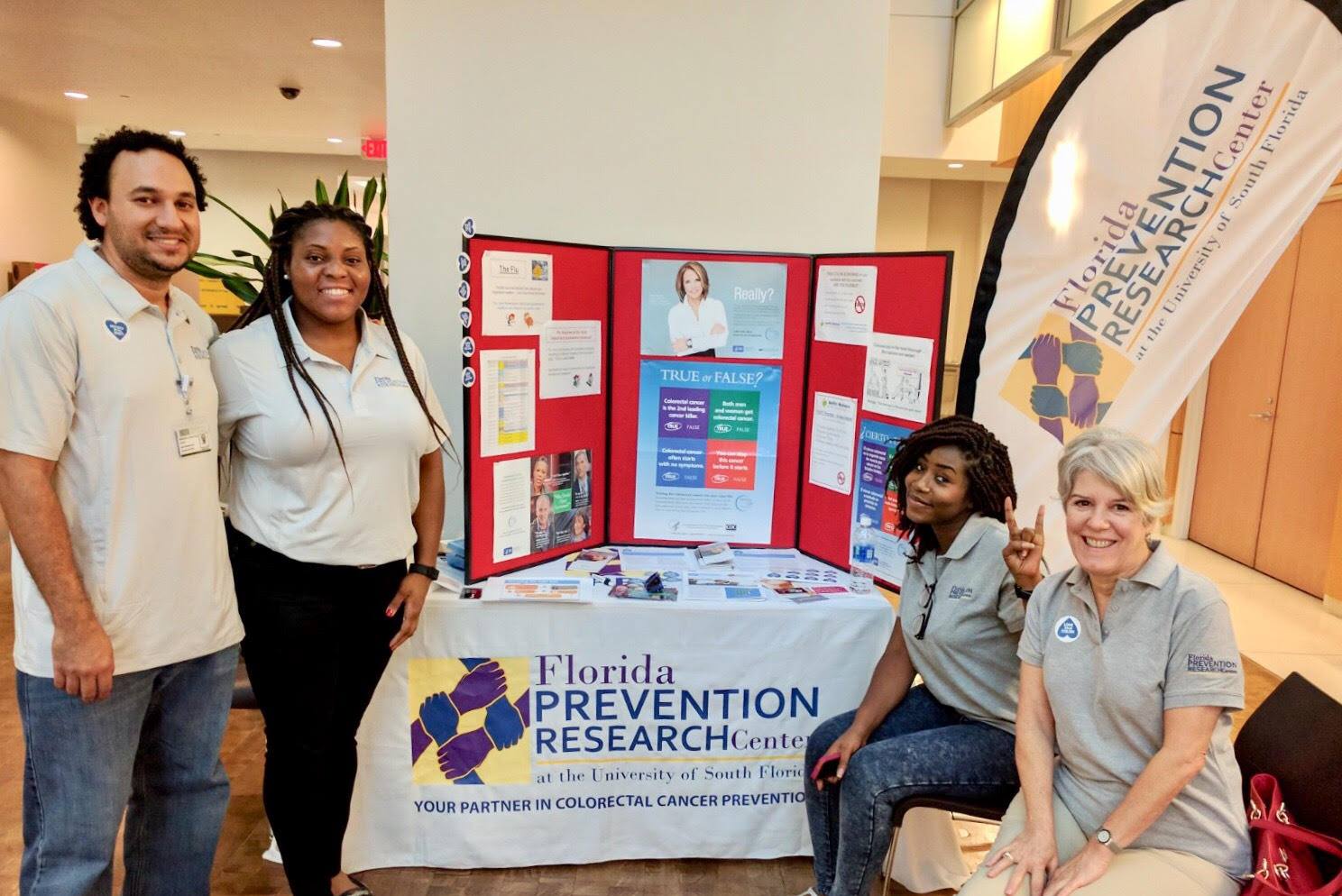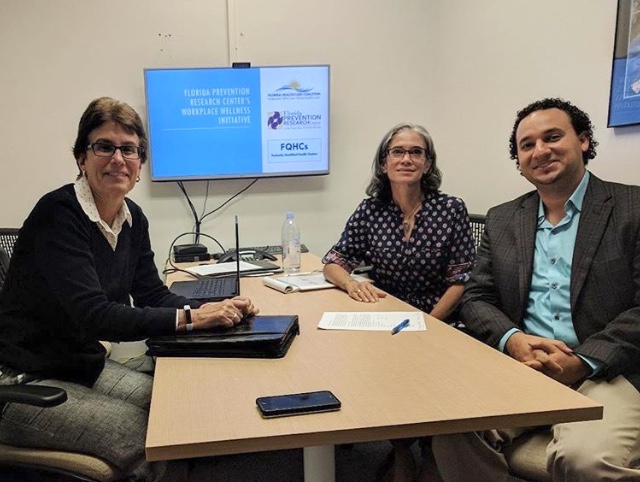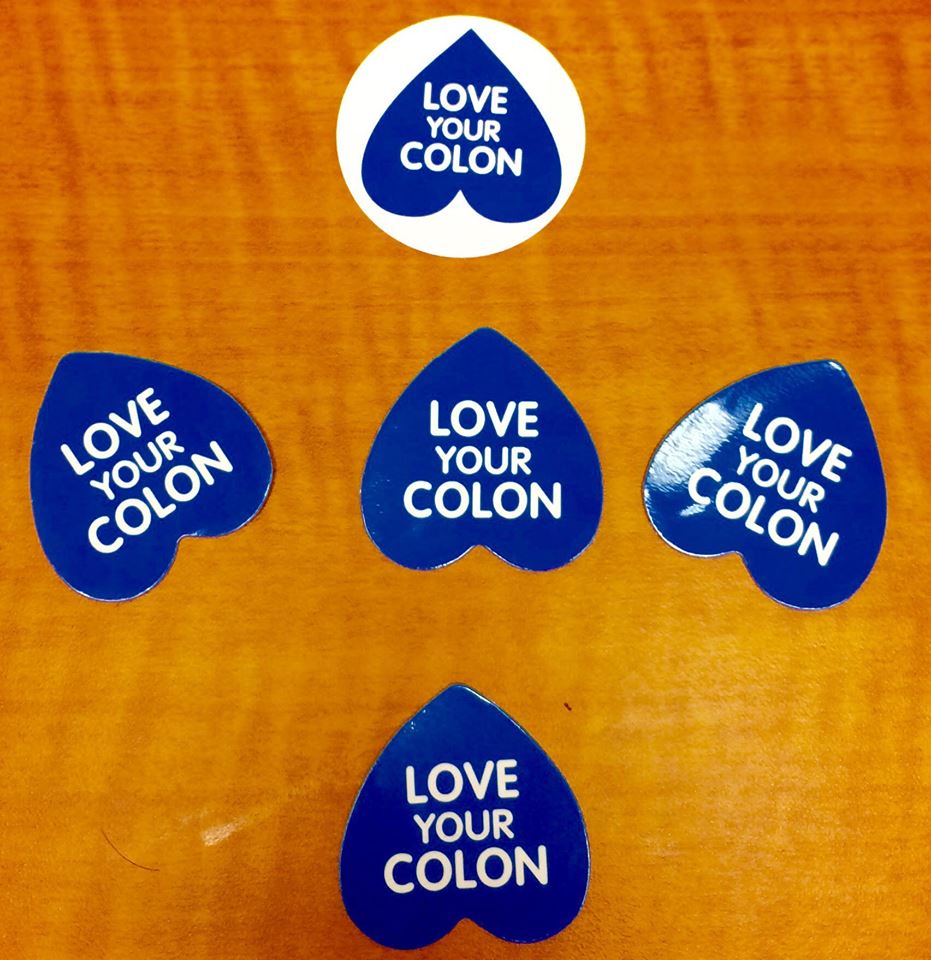FPRC’s intervention combats colon cancer
March is Colorectal Cancer Awareness Month
Colon cancer is the second deadliest cancer in the U.S. for cancers that affect both men and women, but early detection is key to prevention, according to Dr. Claudia Parvanta, director of the Florida Prevention Research Center (FPRC) at the USF College of Public Health.
The FPRC, a member of the CDC’s Centers for Excellence in Prevention Research, aims to increase colorectal cancer screening across the state of Florida to reach 80 percent by 2018.
Using the social marketing technique of community-based prevention marketing for social change as their framework, they’re focusing intervention efforts among two groups: insured individuals who are 50 years or older and individuals who have access to primary care, but are underinsured or have no insurance.

FPRC team members at a wellness fair hosted at Moffitt Cancer Center promoting colorectal cancer screening. From left: Manuel Mayor, intervention program manager and COPH alumnus, Aldenise Ewing, graduate assistant and COPH doctoral student, Laura Okoli, graduate assistant and COPH master’s student, and Dr. Claudia Parvanta, director of the FPRC. (Photo courtesy of FPRC)
“Colorectal cancer is one of the most preventable cancers when detected early and screening when recommended is imperative,” said Manuel Mayor, intervention program manager and COPH alumnus.
Mayor said the intervention has been designed as a two-tiered approached in order to reach the groups designated.
They’ve partnered with the Florida Health Care Coalition, a collaborative of more than 4,000 employers in the state of Florida, as well as True Health, a federally qualified health center (FQHC) provider with eight clinic sites in the Orlando area.
As the intervention program manager, Mayor coordinates with both the employer and FQHC sides of the project. He interacts with wellness coordinators and community leaders on ways to promote colorectal cancer screening.
“This is public health in action,” Mayor said.
He said they’ve established relationships with employers in Orlando, West Palm Beach and Miami, and the number of sites are growing.

Manuel Mayor (far right), intervention program manager, meeting with Miami Dade College wellness coordinators, one of the established intervention sites for increasing colorectal cancer screening. (Photo courtesy of Manuel Mayor)
Dr. Dina Martinez-Tyson, assistant professor of community and family health, has been with the project since the early planning stages and oversees the employer side of the intervention.
“I’ve learned how important employers are as stakeholders in our health care as well as the role they play in what your insurance covers and the benefits employees receive,” she said. “Our goal is to give the employers the resources and tools they can select from to promote colorectal cancer screening at their work sites and continue to use in the future.”
Mayor and other FPRC members work with the wellness coordinator of each organization to promote colorectal cancer screenings through tabling at health-related events and dissemination of intervention materials including flyers, brochures, newsletters, and one-page info sheets detailing the importance of colorectal cancer screening for the prevention of colon cancer.
She said the FPRC team also puts together kits with screening information and educational materials.
“We’ve given them [employers] a menu of options they can pick from,” Martinez-Tyson said. “Employers can tailor and customize to what their needs are as well as build on the resources they have.”

Some of the campaign materials the FPRC team uses to promote colorectal cancer screening. They were designed by Genentech and are just one of the many promotional materials the team has adapted to use as part of the intervention. (Photo courtesy of Laura Okoli)
While meeting with insured individuals, the FPRC team members will share information about the importance of colonoscopies and also share information about the fecal immunochemical test (FIT), a cancer screening tool that tests for blood in the stool.
“We’re promoting both the use of FIT, a cancer screening tool that can be done in the privacy of your own home, as well as colonoscopies because some of the pushback we’ve received about colonoscopies is that some find them uncomfortable,” she said.
Dr. Alicia Best, assistant professor of community and family health and co-investigator of the grant, oversees the implementation of intervention efforts on the FQHC side and reaching those without insurance.
“Our intervention strategies are aimed at the community around the health center [True Health], and we’re trying to push people in,” she said. “So, if our intervention is successful, we could potentially increase patient volume at the health center; so we selected sites that can handle that.”
Best said FQHCs are federally-funded centers, designated by HRSA, to serve in medically underserved areas, such as an area with a low proportion of physicians to the general population.
“These are facilities that are well-equipped to serve low socioeconomic populations; they can turn no patient away regardless of their ability to pay,” she said. “They already have to meet HRSA performance metrics, one of which includes tracking their colorectal cancer screening rates. So, this was a primary partner for us because they provide primary care and have a vested interest in colorectal cancer, therefore, we partnered with True Health.”
Best said they have designated two True Health clinic sites as control sites and two as intervention sites—at the intervention sites they will implement the social marketing intervention efforts and at the control sites they will collect baseline and follow-up data.
“We are partnering with local businesses within a two mile radius of the sites, such as barbershops and community centers, to share print-based materials that educates about colorectal cancer screening, but also directs people to get screened at our partner site,” Best said.
Best said the intervention is dissemination of those educational materials and then tracking of engagement, as well understanding how to push people into the centers.
“A lot of people who don’t have access to health care only think about health care when they are sick or not feeling well,” Best said. “The uniqueness of this project is we’re trying to get people to think about screening before they get sick and show symptoms.”
In the future, Best will be implementing the use of social media to evaluate community “hot-spots” and track what specific intervention materials are driving individuals to the clinics.

A large walk-through colon the team plans to implement as part of the intervention efforts. The inflatable colon highlights the types of polyps colonoscopies identify and remove in the prevention of colorectal cancer. (Photo courtesy of Manuel Mayor)
The five-year project, now it is fourth year, will continue through to the end of September.
Best said the FPRC is aiming to conduct this pilot study among the FQHC and employers, analyze how effective it was and expand upon it in the next grant cycle.
“We’re trying to reach two distinct groups who need screening,” she said. “We’re trying to create this culture of screening, so if this works, we can expand to other cancers.”
For more information about the FPRC’s prevention and intervention efforts, visit their website.
Story by Anna Mayor, USF College of Public Health
